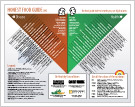
(Natural News) Sorry, gentlemen, but women are better than you at remembering certain things, including conversations and people’s faces.
According to the Encyclopedia of Neuroscience, such types of memories are called “episodic memories” – consciously recollected memories related to personally experienced events. Remembering these is a dynamic process that draws upon both mnemonic and non-mnemonic cognitive abilities to mentally reconstruct past experiences from retrieval cues.
And it seems that women are much better at this than men, according to a recent study.
In an article published in Psychological Bulletin, researchers from Karolinska Institutet in Sweden reported that women are better than men at remembering certain types of episodic memories, specifically those related to remembering speech, such as where they left an object and what happened in a movie. According to the researchers, women are also more apt at remembering faces and sensory images compared to men, who, on the other hand, seem to be better at recalling abstract information and navigational data.
Lead researcher Agneta Herlitz and her team conducted a meta-analysis of 617 studies that took place between 1973 and 2013 – with more than 1.2 million participants overall – before they arrived at their study’s conclusion.
Martin Asperholm, a doctoral student at KI, added that the initial results of their study showed that this advantage on episodic remembering is hinged on the type of memory and material to be remembered. (Related: Improve memory and mood with curcumin: Study finds it boosts cognitive function in those with mild, age-related memory loss.)
Mother Nature's micronutrient secret: Organic Broccoli Sprout Capsules now available, delivering 280mg of high-density nutrition, including the extraordinary "sulforaphane" and "glucosinolate" nutrients found only in cruciferous healing foods. Every lot laboratory tested. See availability here.
The results of their research corroborate the findings of earlier works, which pointed to subtle differences in memory processing between men and women, including a previous paper by Herlitz herself. In that particular study, published in a 1997 issue of Memory and Cognition, Herlitz stated that during episodic memory tests, women consistently performed at a higher level than men — a finding that researchers Paul Loprinzi and Emily Frith soon built upon in their 2008 study which explored the role of biological sex in memory functions.
ABCs of Memory Boosting
Some do’s and don’t’s for improving your memory include:
Added sugar is a no-no
Aside from being a contributor to illnesses such as diabetes and cardiovascular disease, excess ingestion of added sugars has been linked to cognitive decline, as shown by a study published in Behavioural Brain Research, which concluded that even short-term exposure to a diet high in fat and sugar can selectively impair hippocampal-dependent memory.
Try organic, natural sweeteners if you want to indulge your sweet tooth.
Boost your omega-3 intake
Eicosapentaenoic acid (EPA) and docosahexaenoic acid (DHA), better known as omega-3 fatty acids, are important for overall health according to medical experts and have been shown to lower the risk of heart disease, reduce inflammation, relieve stress and anxiety and even slow down mental decline. According to medical experts, these fatty acids are able to do the latter by preserving cell membrane health and by facilitating communication between brain cells.
To boost your omega-3 intake, the American Heart Association recommends eating 2 servings of fatty fish such as wild-caught salmon, mackerel, herring, lake trout, sardines and albacore tuna per week.
Calm down and meditate
Meditation does a lot more for the mind than just relaxing it. According to a study published in the Neuroimage journal, researchers noted that meditation appeared to increase gray matter, the mass which contains neuron cell bodies, in the brain.
Not only that, another study, published in the Evidence-Based Complementary and Alternative Medicine, showed that college students who engaged in meditation practices like mindfulness had significantly better spatial working memory or the ability to hold and process information in your mind about the positions of objects in space than students who did not practice meditation.
For more news and stories about how to improve brain health, visit BrainHealthBoost.com.
Sources include:
















